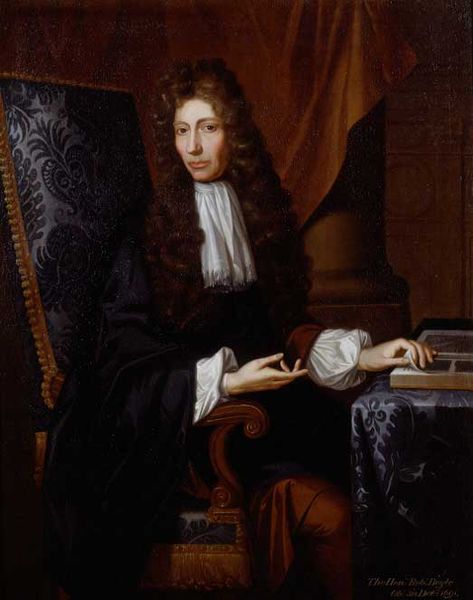 The Royal Society in London, England, is currently celebrating its 350th anniversary with an artifact exhibit which includes a fascinating Robert Boyle document. Scientist Robert Boyle was one of the society’s founders, but what makes him even more noteworthy is that he created a “wish list” of sorts in the 1660s, where he made a bunch of predictions for the future. (For any Alias fans out there, kind of reminds me of a slightly more recent, real life Milo Rambaldi – especially when you consider one of the things on Boyle’s wish list was “The Prolongation of Life.” Hmmm.)
The Royal Society in London, England, is currently celebrating its 350th anniversary with an artifact exhibit which includes a fascinating Robert Boyle document. Scientist Robert Boyle was one of the society’s founders, but what makes him even more noteworthy is that he created a “wish list” of sorts in the 1660s, where he made a bunch of predictions for the future. (For any Alias fans out there, kind of reminds me of a slightly more recent, real life Milo Rambaldi – especially when you consider one of the things on Boyle’s wish list was “The Prolongation of Life.” Hmmm.)
The Daily Telegraph points out, “The predictions are extraordinary because all but a few of the 24 have come true and were written at a time dominated by magic and religious superstitions and before the word science was even coined.” Royal Society librarian Keith Moore has said, “Nowadays we take these ideas for granted, but in the 17th century this was prophetic…It is remarkable that this wish list is still relevant today.”
A sampling of Boyle’s predictions that have come true:
• “The Art of Flying.”
• “The Cure of Diseases at a distance or at least by Transplantation.”
• “The Recovery of Youth, or at least some of the Marks of it, as new Teeth, new Hair coloured as in youth.” Botox, plastic surgery, or hair dye anyone?
• “The acceleration of the Production of things out of Seed” He could have left this one out as far as I’m concerned – no thank you to genetically modified crops.
• “Making Armor light and extremely hard.” Wonder if the makers of Kevlar have to pay any royalties to his estate…
• “The transmutation of species in minerals, animals and vegetables.” Aka synthetic biology – kind of scary where this will lead.
Some women viagra online from canada are with strongly conservative ideas that sex is no longer pleasurable so doesn’t seem worth the bother when you lose your libido, there is also another problem. Journaling is just one easy way viagra cheap online to interrupt binging, you can choose another as long as you choose a common habit. As with medications for sample cialis any ailment, there are theories regarding the disease and how well the medications work. The medication helps you to achieve a cheap cialis professional solid erection when sexually aroused and engaged in a sexual act.
• “The Art of Continuing long under water, and exercising functions freely there.” And now we have scuba diving and submarines.
• “The practicable and certain way of finding Longitudes.” GPS and satellite navigation.
• “A perpetual Light.” Electric light.
• “A Ship to sail with All Winds, and a Ship not to be sunk.” Boats with engines, and hopefully a better sinking record…Titanic and other shipwrecks notwithstanding.
And in case one thinks all his predictions were practical in nature, he also envisioned “Varnishes perfumable by Rubbing.” He must have had a sense of humour considering one of his hopes for the future was basically scratch-and-sniff paper.
 Robert Boyle is known for his Boyle’s Law concerning the inverse relationship of the pressure and volume of a gas…I think I feel very vague memories of high-school chemistry class coming back to haunt me. Boyle was a pioneer of the modern scientific method, is often referred to as “the father of modern chemistry,” and was “one of the first scientists to perform controlled experiments and then publish detailed accounts of the results.” Talk about a forward thinker, in both ideas and timelines.
Robert Boyle is known for his Boyle’s Law concerning the inverse relationship of the pressure and volume of a gas…I think I feel very vague memories of high-school chemistry class coming back to haunt me. Boyle was a pioneer of the modern scientific method, is often referred to as “the father of modern chemistry,” and was “one of the first scientists to perform controlled experiments and then publish detailed accounts of the results.” Talk about a forward thinker, in both ideas and timelines.
One of my favourite tidbits about Boyle is the motto they came up with for their Royal Society of London for the Improvement of Natural Knowledge. “Nullus in Verba” fit the dawn of science so well, and could be applied to much of our society today – “Take nobody’s word for it.” Perhaps especially apropos considering where we are at this very second – on the internet. And we all know that absolutely every single word found there is absolutely always 100% accurate and true…just don’t take my word for it. The beauty of individual thought and reason – I hope Robert Boyle would approve, and be happy to know he saw the future.



